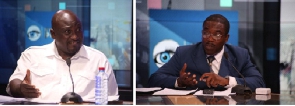A first-of-its-kind maritime tertiary institution in the West African sub region, the Regional Maritime University is poised to undergo a USD146M Modernization Project. This project to be funded by the Korean Exim Bank, is expected to give the school a major facelift making it comparable to world-class maritime tertiary institutions across the globe.
The highlight of this project is the acquisition of a training vessel around the cost of USD47M, something the school has been clamouring for, for decades.
According to the Acting Dean in charge of Maritime Studies at the University, Prof. Capt. Ofosu-Boateng, a framework of agreement has been signed and feasibility studies have been conducted proving the commitment of both the governments of Ghana and Korea to this massive project.
However, the Acting Dean, of Maritime Studies at RMU called for expedited action from the government by way of cabinet approval to give way for the project to start. Speaking on the award-winning sector-specific Eye on Port program, Capt. Ofosu-Boateng says the program is slated to begin in 2024.
He said one key objective of this modernization project is to transform the university in tandem with technological advances in the maritime domain.
He revealed that the training vessel to be acquired will not be a refurbished one but something to be newly constructed in Korea.
“It’s going to take 120 cadets and aside from its complement of crew that it will come along with like engineers and navigators, we are also tinkering with the idea that we will make it operate like Mercy Ships where the old seafarers will come on board and help with tutoring,” Prof. Capt. Ofosu Boateng said.
He said the project will come with two rescue boats, two big buses for transportation, 10 SUV Units, and a 4-storey maritime simulation center where simulators will be housed.
In addition to that, he disclosed that there will be a state-of-the-art 1800-seating-capacity lecture theatre which is expected to take care of growing student intake.
Other facilities include a new sick bay, a Vice Chancellor’s residence, staff accommodation, a sports complex, a brand new graduate school, a fishing gear workshop, reservoirs and underground water tanks, a service unit for the transportation department, and new roads among other things.
He expressed contentment with the flexibility of the loan arrangement.
“For me, it’s a very flexible loan. The interest is very minimal and the time frame to repay is over 40 years and I believe it is so because of the educational part of it. It’s non-profit, we are doing it to help humanity, to educate, and to build capacity. Those were some of the things that were factored, in to make it minimal and very attractive.”
Adding on, a Lecturer with the Marine Engineering Department, Emmanuel Yaw Mawuko Kudzedzi said the RMU is modeling its training regimen after the UK, which practices a hybrid system of academic and vocational training.
He said the acquisition of a training vessel is long overdue, and fulfills the requirements of the International Convention on Standards of Training, Certification, and Watchkeeping for Seafarers.
“From level 100 to 400, in the STCW training component of engineers and deck officers, you need a certain amount of sea time. With the availability of the training vessel, the students will serve on that vessel and offset the amount of time that will be required after graduating. This will really fast-track the period they become competent officers. Instead of the 12 months that they will be required to go on ships after school, this will be reduced if they acquire some of the training on board while in school. It will also reduce the waiting time at home for Bernhard Schulte, Hafnia, Danoas, and other European companies to engage them to do their sea service.”
Mr. Kudzedzi, who is the Industrial Liaison Officer at RMU added that with an in-house training vessel on campus, students will become familiar with the current equipment being used in the maritime industry and the standards of conduct.
Business News of Tuesday, 10 October 2023
Source: Eye on Port
RMU hopeful for expedited government action to kick-start US$146m modernization project
Entertainment












